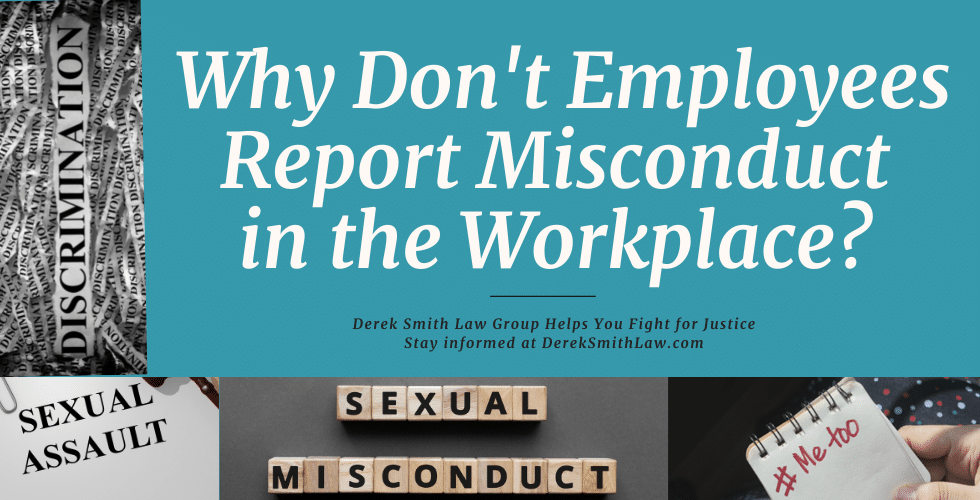Only a Small Percentage of Misconduct at Work Gets Reported Every Year.
Employment discrimination and sexual harassment affect thousands of employees a day across the country. However, only a fraction of these issues get reported to the proper federal or state agencies. Even fewer become lawsuits against employers.
Why do so many acts of misconduct at work go unreported every year? Why do so many employees and job applicants choose to ignore their rights? Why do they refuse to fight for justice in the workplace? The reality is that many employees worry about retaliation, humiliation, losing their job, and upsetting the work environment. Therefore, they tend to keep quiet rather than stand up for what they know is right.
Read on to learn more about why employees choose to turn the other cheek to misconduct in the workplace.
1. Employees Fear Retaliation Most
Many employees think their employers will strike back against them for reporting misconduct in the workplace. Whether they get fired from work in an act of wrongful termination, demoted, refused a promotion, blacklisted, or otherwise made to work in a hostile work environment, retaliation can ruin their current and future career.
Therefore, employees would rather stay quiet and put up with the misconduct instead of exercising their rights to report misconduct in the workplace. They believe that if they stay quiet, they will get to keep working, bring home a decent paycheck, and stay in line for raises and promotions as they occur.
2. Employees See Misconduct as Part of the Workplace Culture
When new employees enter a workplace, they tend to observe the culture while getting acquainted with the job. Sometimes sexist comments, sexual jokes, sexual gift-giving, making fun of people based on race, religion, or nationality, or general misconduct is an accepted part of the work environment. No one seems offended by the actions. Therefore, everyone laughs and keeps going on with their day.
People, however, may be offended by these actions or comments. Yet, they noticed the same workplace culture when they started. Therefore, they chose to bite their tongue and ignore the comments or actions. Now that you have joined the workplace, you will continue the cycle and refuse to report misconduct, even if it offends you. You do not want to upset the status quo.
3. Employees Do Not Want to Ruffle Any Feathers
When issues such as sexual harassment and employment discrimination occur, it can create a horrible working environment for any employee. However, when certain coworkers, managers, or supervisors are involved in these actions, you may choose to stay quiet rather than set a storm of events into action.
Employees may feel that they will be subjected to a hostile work environment, workplace harassment, or extreme retaliation if they upset the “favorite” employees, supervisors, or managers in the workplace. Rather than face these concerns head-on, they allow the offensive behavior or workplace misconduct to go unreported.
4. Employees Fear Blacklisting in Their Industry
Some forms of retaliation can be more severe than others. Blacklisting may be one of those forms of retaliation that can be detrimental to your entire career. When your employer blacklists you, you cannot get hired by anyone in your industry. You may not even get hired by anyone outside your industry looking to fill a position with your professional expertise.
Blacklisting can last a few months to several years. It can prohibit you from working or making a living wage. You may find yourself working menial jobs just to pay the bills.
As a result of such horrible consequences, many employees tend to keep quiet about any misconduct in the workplace rather than exercise their rights under federal and state employment laws. As a result, they protect their current and future career ambitions.
5. Employees Do Not Think Reporting Misconduct Is Worth Their Time
Many times, employees keep quiet about misconduct in the workplace because they do not think it will result in anything worthwhile. They think a little employment discrimination or sexual harassment is part of many workplaces. Therefore, the time, energy, and risk they take to report misconduct and potentially file a lawsuit against their employer is a waste of time.
Therefore, they choose to keep quiet. These employees may quit a few weeks after experiencing misconduct. They may choose to stay with the company and overlook the employment discrimination, sexual harassment, and retaliation they witness. However, if they knew the lawsuit would result in compensation, they may otherwise report the misconduct.
What Should You Do If You Witness Misconduct at Work?
It may be scary or unnerving to file a report for misconduct in the workplace. However, reporting such behavior is essential to ensure it stops in your workplace and other workplaces across the country. Letting it go means that generations to come will allow the cycle to continue and the problem will never get addressed.
If you work with a qualified employment lawyer regarding your report of sexual harassment or employment discrimination, you will receive the help you need to protect yourself and your rights to work. Your lawyer can help ensure that you receive the compensation you deserve to take the leap of faith and report misconduct in the workplace. They can also help you ensure your workplace embraces policy changes and starts treating employees with more respect while following the law.
Have Questions? Our Employment Lawyers Are Here to Help. Free Consultation (800) 807-2209
If you witness misconduct in the workplace, you have the right to report it. You may receive significant compensation, depending on the case details and your losses. The experienced employment lawyers at the Derek Smith Law Group in New York City, New Jersey, Philadelphia, Miami, and Los Angeles can help. Call us today for a free consultation.

